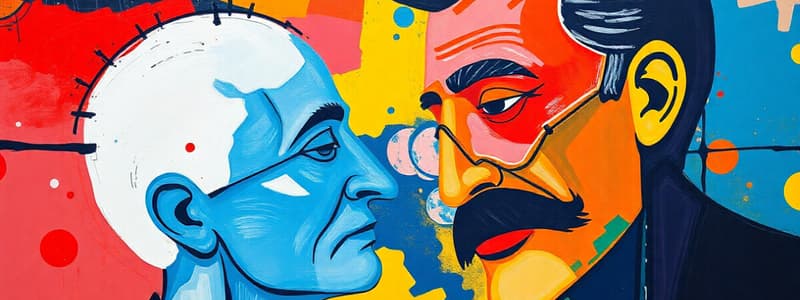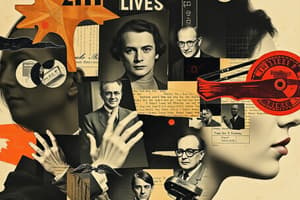Podcast
Questions and Answers
Which of the following is NOT considered an archetype?
Which of the following is NOT considered an archetype?
- The Scapegoat
- Heaven (correct)
- The Hero
- The Devil Figure
Eurocentrism emphasizes the cultures and values of non-European nations.
Eurocentrism emphasizes the cultures and values of non-European nations.
False (B)
What term describes the practice of absorbing and accepting different ethnic customs and traditions?
What term describes the practice of absorbing and accepting different ethnic customs and traditions?
Assimilation
The 'feminine' side of the psyche that is often repressed in men is called the ______.
The 'feminine' side of the psyche that is often repressed in men is called the ______.
Match the literary concept to its correct definition:
Match the literary concept to its correct definition:
Which archetype represents a journey towards personal growth or fulfillment?
Which archetype represents a journey towards personal growth or fulfillment?
Which part of the mind is primarily associated with societal expectations and moral standards?
Which part of the mind is primarily associated with societal expectations and moral standards?
Imperialism refers to the policy of retreating from colonies and ceasing control over foreign entities.
Imperialism refers to the policy of retreating from colonies and ceasing control over foreign entities.
Marxist critics view literature as a direct reflection of personal opinions detached from social and cultural contexts.
Marxist critics view literature as a direct reflection of personal opinions detached from social and cultural contexts.
What term is used to describe the manipulation of language to alter meaning?
What term is used to describe the manipulation of language to alter meaning?
What is the term for the control and dominant influence of one country over another?
What is the term for the control and dominant influence of one country over another?
The psychological method that investigates the unconscious elements of the mind is called _______.
The psychological method that investigates the unconscious elements of the mind is called _______.
Match the following terms related to Marxism with their definitions:
Match the following terms related to Marxism with their definitions:
Which part of Freud's theory is responsible for controlling the impulses of the id in a healthy way?
Which part of Freud's theory is responsible for controlling the impulses of the id in a healthy way?
The status quo refers to the desire for change within a society.
The status quo refers to the desire for change within a society.
What is the primary focus of psychological critics when evaluating literary works?
What is the primary focus of psychological critics when evaluating literary works?
What does the term 'marginalize' mean?
What does the term 'marginalize' mean?
Sexism involves discrimination based solely on gender.
Sexism involves discrimination based solely on gender.
What is one of the main consequences of objectification in literature?
What is one of the main consequences of objectification in literature?
The belief that women are innately inferior to men is known as _____ Chauvinism.
The belief that women are innately inferior to men is known as _____ Chauvinism.
Match the literary theme with its explanation:
Match the literary theme with its explanation:
Which of the following best describes 'subordinate'?
Which of the following best describes 'subordinate'?
The theme 'Good vs. Evil' shows that humans only sometimes struggle between right and wrong.
The theme 'Good vs. Evil' shows that humans only sometimes struggle between right and wrong.
Describe the theme of 'appearance vs. reality' in literature.
Describe the theme of 'appearance vs. reality' in literature.
Flashcards
Id
Id
The part of the mind that seeks immediate gratification and pleasure, driven by basic instincts.
Superego
Superego
The part of the mind that governs the conscience and internalizes societal rules and morality.
Ego
Ego
The mediator between the id's impulses and the superego's restrictions, finding a balance between desires and societal expectations.
Collective Unconscious
Collective Unconscious
Signup and view all the flashcards
Archetype
Archetype
Signup and view all the flashcards
Shadow
Shadow
Signup and view all the flashcards
Propaganda
Propaganda
Signup and view all the flashcards
Status Quo
Status Quo
Signup and view all the flashcards
Pathetic Fallacy
Pathetic Fallacy
Signup and view all the flashcards
Colonialism
Colonialism
Signup and view all the flashcards
Eurocentrism
Eurocentrism
Signup and view all the flashcards
Imperialism
Imperialism
Signup and view all the flashcards
Assimilation
Assimilation
Signup and view all the flashcards
Hegemony
Hegemony
Signup and view all the flashcards
Male Chauvinist
Male Chauvinist
Signup and view all the flashcards
Marginalize
Marginalize
Signup and view all the flashcards
Sexism
Sexism
Signup and view all the flashcards
Subordinate
Subordinate
Signup and view all the flashcards
Objectification
Objectification
Signup and view all the flashcards
Loss of Innocence
Loss of Innocence
Signup and view all the flashcards
Good vs. Evil
Good vs. Evil
Signup and view all the flashcards
Appearance vs. Reality
Appearance vs. Reality
Signup and view all the flashcards
Marxism
Marxism
Signup and view all the flashcards
Fearmongering
Fearmongering
Signup and view all the flashcards
Psychoanalysis
Psychoanalysis
Signup and view all the flashcards
What is the collective unconscious?
What is the collective unconscious?
Signup and view all the flashcards
What are archetypes?
What are archetypes?
Signup and view all the flashcards
What's the Hero archetype?
What's the Hero archetype?
Signup and view all the flashcards
What's the Scapegoat archetype?
What's the Scapegoat archetype?
Signup and view all the flashcards
What's the Outcast archetype?
What's the Outcast archetype?
Signup and view all the flashcards
What's the Devil Figure archetype?
What's the Devil Figure archetype?
Signup and view all the flashcards
What is colonialism?
What is colonialism?
Signup and view all the flashcards
What is Eurocentrism?
What is Eurocentrism?
Signup and view all the flashcards
Study Notes
Freud's Theory of the Mind
- Superego
- Id
- Ego
- Eggs
Marxism
- Marxist critics view literature as a reflection of social, cultural, and political contexts.
- Marxist critics focus on how those in power manipulate the lower classes.
- Common Enemy: a scapegoat used to distract from societal problems.
- Euphemism: softening language to avoid confrontation.
- False Consciousness: Lack of awareness of oppression.
- Fearmongering: Spreading fear to control the people.
- Oppression: Prolonged, cruel, or unjust treatment and control.
- Propaganda: Information used to influence or harm people.
- Status Quo: Existing order of power structures and norms.
Literary Concepts
- Convention
- Associative Language
- Archetype
- Collective Unconscious
- Shadow
- Monomyth
Psychoanalysis
- Psychological critics analyze texts through a psychological lens.
Archetypes
- Collective unconscious
- Pathetic fallacy
- Generated by man's psyche
- Express themselves in characters, situations, and symbols
- Preconscious instinctual
- Monomyth
- Types of archetypes: Hero, Scapegoat, The outcast, Devil Figure, Earthmother, Temptress, Platonic Ideal, The Star-crossed lover, The quest, The initiation, The journey, The fall, Death and Rebirth, Self
- Shadow: The unknown, dark, shadowy, and frightening part of the human psyche.
- Anima: The feminine aspects of the male psyche.
- Animus: The masculine aspects of the female psyche.
Postcolonial
- Colonialism: A political-economic system where European nations explored, conquered, and controlled other territories.
- Colonial discourse: Justifying colonialism.
- Eurocentrism: prioritizing European values and culture.
- Imperialism: Extending control over foreign entities.
- Assimilation: Absorbing and accepting different ethnic customs.
- Hegemony: Controlling another country indirectly.
- Orientalism: A social construct of other cultures.
- Feminism: Gender equality in social, economic, and political realms.
- Patriarchy: A system where men hold authority in society.
- Male Chauvinist: The belief that men are superior.
- Marginalize: To subordinate a group.
- Sexism: Discrimination based on gender.
Themes in Literature
- Subordinate: Belonging to a lower or inferior class or rank; secondary; subject to the authority or control of another.
- Objectification: Representing a person as an object.
- Loss of innocence: The transition from naivety to maturity.
- Good vs. Evil: The struggle between moral forces.
- Appearance vs. Reality: Disillusionment when reality doesn't match perception.
- Isolation and Suffering: Pain from social isolation and loss.
Studying That Suits You
Use AI to generate personalized quizzes and flashcards to suit your learning preferences.




